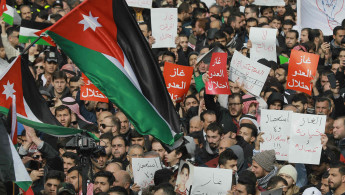Jordanians renew mass protests against gas deal with Israel
Hundreds of Jordanians demonstrated in downtown Amman on Friday, calling on the government to cancel an agreement in which Israel began pumping natural gas to the kingdom this year.
Jordanian security forces prevented the protesters from reaching the symbolic Al-Nakheel Square in the capital, where the turnout had been expected to grow larger.
Earlier this month, Jordan's National Electric Power Co. said gas pumping had started as part of a multi-billion-dollar deal with Texas-based Noble Energy aimed at lowering the cost of power in the energy-poor kingdom.
Noble Energy and Israel's Delek Group are, among others, partners in the newly operational Leviathan gas field off Israel's Mediterranean coast.
In a statement then, NEPCO said importing the gas from Israel was "the last option" after supplies of Egyptian gas came to an end after its pipeline was repeatedly targeted by Islamic State-affiliated militants in Sinai. NEPCO said Israel was "the only available source".
At odds with the kingdom's official policy, many Jordanians still see Israel as an enemy and often meet steps toward normalisation with great public backlash. Roughly 70 percent of Jordanians are of Palestinian origin.
Twitter Post
|
Dozens of police Friday formed lines to prevent protesters from marching. The demonstrators chanted anti-Israel slogans and held banners reading, "The gas of the enemy is an occupation!" and "Down with the gas deal".
The Jordanian flag-waving protesters also threatened to overthrow the government if it sticks by the gas deal.
Murad al-Adayleh, secretary general of the Islamic Action Front Party, called on the government, "which has allowed the start of importing the gas", to step down.
When the deal was signed in 2016, it was not reviewed by Jordan's lower house of Parliament. Last year, that body issued a non-binding resolution against the agreement.
A parliament session was planned for Sunday to submit an urgent memo requesting a ban on gas purchases from Israel.
The $10 billion deal is expected to provide 45 billion cubic meters of Israeli gas to Jordan over the next 15 years.
From the same Leviathan gas field, Israel has also begun exporting natural gas to Egypt. On Friday, Israeli Prime Minister Benjamin Netanyahu boasted about the move, saying on Twitter that he has labored to make Israel a "world power exporter".





 Follow the Middle East's top stories in English at The New Arab on Google News
Follow the Middle East's top stories in English at The New Arab on Google News


